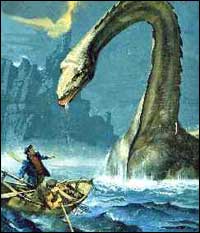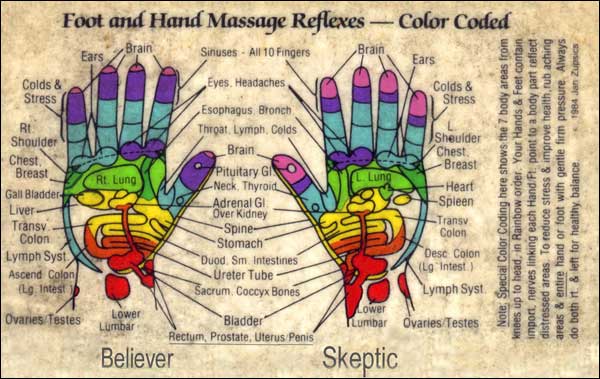
 Perhaps apocryphal: recent reports that the Loch Ness Monster swallowed two tourists have been denied by Scottish police. A spokesperson stated: "While it's true that two people are missing, there's no need to turn a simple UFO abduction into another of those ridiculous Nessie stories!"
Perhaps apocryphal: recent reports that the Loch Ness Monster swallowed two tourists have been denied by Scottish police. A spokesperson stated: "While it's true that two people are missing, there's no need to turn a simple UFO abduction into another of those ridiculous Nessie stories!"
UK Reader Peter Fox confronted a major actor in the paranormal field, one who has written extensively on the subject, and is a popular person on interview shows in the UK. My experience with Rupert Sheldrake has all been by e-mail, and my attempts to test his wonders have been refused. In describing his "dog" tests some years back, I made an error, promptly admitted it, and seemed at that point to have been written off his list as an incompetent, a condition that's remained ever since.
Peter did well, I think, in spite of being in "enemy territory," so to speak. Battling on another man's turf is usually unwise, but sometimes unavoidable...
I am writing to offer your splendid site a copy of a report I wrote on a lecture by Dr. Rupert Sheldrake that occurred at my University last week. I was invited to the lecture by a Christian housemate of mine, even though she knows that I am extremely skeptical of his claims. Being an awkward person in general, I couldn't resist researching the topic beforehand so I could put him on the spot in the Q&A session at the end. On a side note, I have taken a great interest in your work since I saw a television show that you were involved in during the early 1990's and it has always brought me great enjoyment to know that there are people who are trying to stem the flow of bad science and public gullibility.Here is my critique of "Intention, Attention and the Power of Prayer: Recent Experimental Evidence," a lecture by Dr. Rupert Sheldrake.
This lecture took place at UCN, University College Northampton. The audience consisted of approximately 100 people with the majority of them being in their 50's/60's. This lecture was hosted by the Chaplaincy of UCN and this was reflected by the evident dog collars of a couple of the attendees.
Dr. Sheldrake opened the lecture by attacking modern science as being dogmatic and inflexible when it came to dealing with the "taboo." He also attacked intellectuals for not believing in items that "ordinary" people took for granted, such as telepathy. This struck me as being one-sided and assuming a lot about intellectuals and "ordinary" people.
He then went on to speak of vision being a two-way process, with people being aware that they are being stared at. He quoted discredited studies from the 19th century in support of this, before moving on to his own work. He said that his work had been replicated "many thousands of times," with the same significant results being found. This is not surprising, considering that his study has a randomization fault in its methodology (see www.csicop.org and search for Sheldrake). He then mentioned that his work is replicable using a lie-detector-like mechanism to measure people's reactions to being stared at from behind. Considering that the lie detector has been largely discredited in recent years, this is perhaps not as significant as he assumes. Dr. Sheldrake supported this part of his lecture with plenty of anecdotal evidence. This included his interviews with private detectives, security guards, CCTV [closed-circuit TV] controllers, and members of the SAS. He then went on to attack skeptics and intellectuals because their denial of this was, he said, "scary" to them.
Dr. Sheldrake postulated that Quantum Theory would be capable of acting as a mechanism for carrying signals between two emitters. By this he was referring to the Quantum Physics idea that particles that were once joined, have a continued link. This is true at an atomic level, but Quantum Physics has not been found to apply to anything on a "macro" scale.
He then went on to talk about psychic pets. He denounced skeptical conclusions, and claimed that skeptics thought people were stupid and didn't take into account factors such as animals knowing when time was passing, or that they could hear their owner's car return. He talked about his experiment with a dog called Jaytee, and also about Richard Wiseman [prominent UK parapsychologist] and his investigation of this claim. However, in this he misrepresented Wiseman's evidence. Wiseman had found that Jaytee only went to look for his owner, Pam, on three out of four occasions, and on one occasion that he did, he had already been to the window thirteen times. Sheldrake claimed that Wiseman had ignored certain significant elements, and was now refusing to discuss the issue. This was supported by numerous graphs and anecdotal evidence ad nauseam. He talked a lot about the levels of significance of his work, but failed to say that his methodology has been heavily criticized.
Next, he spoke about the power of prayer. He mentioned lots of American studies that he said have shown that patients in hospitals who are the subjects of intercessionary prayers recover more quickly than people who are not. On this short note on the power of prayer, he finished the lecture and it was time for questions.
I asked Dr. Sheldrake a long 4-part question. I asked first if he would refrain from comment until I had finished the question, in order to avoid the possibility that he would criticize my first part before I had finished the whole. On a personal note, it is somewhat daunting to ask a question in front of 100 people who are highly supportive of Dr. Sheldrake and his work. I had the feeling that it would be tantamount to claiming that the world is round at a Flat Earth Society gathering. The question ran somewhat as follows:
Dr. Sheldrake, bearing in mind that Colwell, Shroder and Sladen at Middlesex University, testing the "staring" effect, found the same results as you when using your methodology but got results in accordance with chance when they corrected a error in the randomization procedure, and that Quantum Physics has not been proven to work on anything but the microscopic level, and that Wiseman and Smith found no significance when testing the psychic ability of the dog Jaytee — despite what you say about their work, and that Dr. Tessman and Dr. Posner have critiqued the work of Harris, Byrd and Dossey involving the success of prayer, would you agree that although your work may be correct, it may also be a house of cards, and that further investigation is required before any conclusions are reached?
It was a long question, and Sheldrake endeavored to answer it. He replied that the area was an ongoing debate and did need more investigation, but there was little funding available for it — most funding going to conventional science. He then attacked Sladen et al as being "professional dogmatic skeptics." This was his way of dealing with the criticism that they had leveled against his work. He sidestepped the question of faulty randomization in his "staring" tests, and also avoided the question of Quantum Mechanics. I found his answer to be superficially attractive to people who accepted it at its face value. To those of us who thought more deeply about it, he didn't really answer my questions in any meaningful way. The question-and-answer session was surprisingly short, and I didn't get the chance to ask another question, which was a pity.
The host closed by saying that it had been a night where faith and science had been brought together. Faith was there, but what science there was, was bad science, and unsubstantiated by anything approaching a replicable and accepted experiment.
Peter, I've always been puzzled by Rupert Sheldrake. Mind you, all devout believers in paranormal claims puzzle me, but usually those folks are uneducated, or religiously motivated. The physicists who steadfastly believe in dowsing, are even more confusing — and confused — though I'm aware of the strength of the idiomotor effect that can so easily bypass their common sense and judgment. Sheldrake has written such transparently inept accounts of what he chooses to call "definitive" experiments, that I've a problem deciding whether he knows the experiments are badly done, or actually thinks he's done proper scientific work.
Note, too, his practice of attacking the critics, rather than proving his point. That's typical. Richard Wiseman denies that he has ignored Sheldrake's evidence, and that rather than refusing to discuss the matter, he has written an article about it in the British Journal of Psychology. Much of this research is described in his book, "Deception and Self-deception: Investigating Psychics." I have offered to test — with adequate academic assistance, including Rupert Sheldrake himself — the dog Jaytee, but Wiseman has notified me that the dog's owners have decided they don't like me, and have refused to have me involved in any such research. I cannot question their dislikes, but I can question their motives.
Reader John Stone complains:
I'm currently going through a bad period, New Age-wise.My acupuncturist keeps needling me, I don't see eye-to-eye with my iridologist, my graphologist can't read my writing, I feel manipulated by my chiropractor, my touch therapist won't keep her hands off me, I can't count on my numerologist, my homeopath doesn't give me much of anything, and my psychic healer makes me sick.

I found this diagram of the "acupressure" points in the hands, and got creative. I altered them a bit, showing a comparison between the hand of a believer and the hand of a skeptic. Being new at this art, I may have missed a few points...
A few weeks ago, discussing the Santa Claus matter, I said that I found it to be "a fun thing, used with kids who haven't yet learned to recognize the difference between reality and fantasy." Well, reader David Deutsch has rightly taken me to task for this:
But this is nonsense, James. If they could not tell the difference between reality and fantasy, then they would not be disappointed to be told that Santa Claus isn't real.Moreover, if Santa Claus stories were being told in the same spirit as Snow White and Winnie the Pooh stories, then parents would no more go ballistic when someone told their children the truth about Santa Claus than they do in regard to Snow White and Winnie the Pooh. But they do go ballistic, don't they?
These years "up to about five years of age" are important years. They are years in which we discover not only the meanings of words and sentences, but the basic conceptual framework upon which we shall be building our understanding the world for the rest of our lives. Being taught lies and irrational modes of thinking during this period runs a coach and horses through a person's attempts to make sense of the world. And these are not just any lies; they are lies that have evolved over the generations to embed religious doctrines and magical explanation in the child's cosmology, his sense of morality, and his relationship with his parents. They also reward gullibility and frustrate scepticism.
These are also years in which human beings are exceptionally dependent on the integrity of other people for the quality of the information they receive. They have little option but to trust -- and it is a scandal that this trust is systematically betrayed.
You have inadvertently allied yourself with evil here. Please put it right.
I probably should have considered the fact that parents specifically promote and encourage belief in the reality of Santa, something they don't do with other fairy tales. I thank Mr. Deutsch for sharing his opinion with us, and for making me re-think my opinion. You can visit him at http://www.qubit.org/people/david/David.html
A new reader writes from the UK on the same theme...
I don't know if you're aware, but recently a Reverend over here in the UK went to a primary school and told classrooms of children that Santa doesn't exist, which, as with the Coral Springs school in Florida, caused a flurry of complaints from the parents. He did more than tell them Santa doesn't exist, though. I can't recall the details, but he said "if Santa existed and traveled all round the world, then he would have to be...which would result in... that sort of thing — I doubt this was a pretty picture for the children!Chris Moyles, a popular radio DJ over here, commented on the issue, though. He addressed the Reverend's calculations on Santa's existence, and said that he had done some himself, only to conclude that, in order for Jesus to walk on water, he would have to have feet the size of open umbrellas, and bring them from the water up to his chest at a rate of 30 times a second! THEREFORE....well, I'm sure you can work it out!
Unfortunately, with divine powers to invoke when faced with difficult problems like this, the believers just smile smugly and cast their eyes skyward.
 It's also pretty hard to understand folks who can accept and observe some of the rules found in the Bible, Koran, Popul Vuh, and other "sacred" books, while simply ignoring others. A reader has sent me this purported letter from a confused Bible student, showing his dilemma very clearly as he prepared to go home for Xmas. I spared you this at the holiday season...
It's also pretty hard to understand folks who can accept and observe some of the rules found in the Bible, Koran, Popul Vuh, and other "sacred" books, while simply ignoring others. A reader has sent me this purported letter from a confused Bible student, showing his dilemma very clearly as he prepared to go home for Xmas. I spared you this at the holiday season...
My teacher has told me all the answers that I need are in the Bible, and I believe that. Determined to be a good Christian, I'm up at Bible college right now, but I'm going home on Friday and I need some advice.Now, my dad and I are thinking about selling my sister off into slavery, as sanctioned in Exodus 21:7. She's in college, pretty smart, very attractive, she has good manners and she's very friendly. What price do you think we could get for her on the open market?
After we get that finished, I have another problem. My father keeps insisting on going to the office to do some work every Sunday after church gets out. Exodus 35:2 says that he should be put to death. Am I morally obligated to kill my father myself? I don't really want to do that, I love him a lot. So, should I call in someone else?
Here's another problem: My hometown football team has made it to the playoff game, but I'm worried about them. Leviticus 11:7 says that touching the skin of a dead pig makes one unclean. Can they still play in the playoff game? Should we get rid of footballs and use something else?
Also, does the entire town really have to get together to stone my Uncle Herald for planting different crops side by side? He's farmed his whole life and knows this is good for the land. Thing is, there are over 2,500 people in my town and it's going to be hard to get them all together to stone my uncle to death.
Last thing, I noticed my mom has a sweatshirt that is 50% cotton and 50% polyester. Do we really need to burn her to death with a small family gathering for wearing garments made of two different threads? It wouldn't be Christmas without mom.
I hope you can answer these questions for me before I have to go home on Friday. Thanks for the help!!!
I'll be back in the USA about the time you read this, and probably full of tales about the tests of applicants we made in Korea. The last couple of weeks of updates were prepared before I left for Asia, so I have a lot of catching up to do. Forgive me if your e-mail went unanswered....
I think I can predict that the JREF prize will still be intact...
